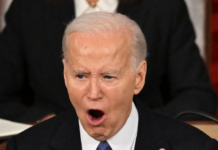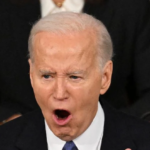
Ah, Michigan Governor Gretchen Whitmer. Caught between a rock and a hard place—well, if the rock is antisemitism and the hard place is the radical left. After days of silence and mounting backlash, Whitmer finally released a statement condemning Rep. Rashida Tlaib, D-Mich., for her “antisemitic” accusations against Michigan’s Attorney General Dana Nessel. For a governor who loves to talk tough when it comes to enforcing mandates or shutting down businesses, it sure took her a while to find her voice on this one.
The controversy all started when Tlaib, never one to shy away from controversial statements, accused Nessel of religious bias. Nessel, who happens to be Jewish, had the audacity to charge a group of anti-Israel protesters at the University of Michigan with trespassing and resisting arrest after they refused to leave an encampment in May. Two of the protesters even faced charges of ethnic intimidation and malicious destruction of property. Pretty cut-and-dry stuff, right? Break the law and face the consequences.
But not according to Tlaib. She suggested that the only reason Nessel charged these protesters was because of her Jewish faith. That’s right—Tlaib implied that the Attorney General’s religion somehow prevents her from doing her job fairly. Nessel, rightfully so, wasn’t having it. She fired back on social media, calling Tlaib’s comments antisemitic and wrong.
But when CNN’s Jake Tapper pressed Whitmer on this growing feud, she couldn’t seem to muster up a clear response. Asked point-blank if she thought Tlaib’s comments were antisemitic, Whitmer ducked. Instead of defending her own attorney general—who, let’s not forget, is from her own party—Whitmer mumbled something about not wanting to “get in the middle of this argument” and how both protesters and public safety need to be balanced. Really, Governor? That’s the best you’ve got?
Her refusal to take a stand didn’t go unnoticed. Anti-Defamation League CEO Jonathan Greenblatt called her out, essentially saying that Whitmer’s “we-want-everyone-to-be-safe” platitudes mean nothing if she can’t even speak up when one of her own officials is being attacked for her faith. Greenblatt was right to say that Whitmer’s hesitance to call out antisemitism—when it’s staring her right in the face—doesn’t exactly inspire confidence in her leadership. After all, Whitmer loves to play up her progressive credentials, but when it comes time to confront the extremes within her own party, suddenly she’s nowhere to be found.
Let’s be honest here. Whitmer’s reluctance to defend Nessel wasn’t just about avoiding a messy political squabble; it was about keeping the far-left wing of her party, represented by the likes of Tlaib, happy. Tlaib is a prominent figure in the so-called “Squad,” and crossing her can lead to all sorts of progressive blowback. Whitmer knows this, which is why she tiptoed around the issue instead of standing up for what’s right. She waited until public outrage grew too loud to ignore before finally offering up a statement that condemned Tlaib’s remarks—but only after everyone had already noticed her conspicuous silence.
Gov Whitmer statement just now: https://t.co/CUOg7fIclH pic.twitter.com/EgIkoF93CV
— Jake Tapper (@jaketapper) September 23, 2024
This video was released around the same time. This is who our elected leaders are? No wonder we’re in such trouble.
AWFLs are going to destroy this country and repeat lame Gen Z catchphrases while doing it. pic.twitter.com/rWuwmYTIw1
— Bonchie (@bonchieredstate) September 24, 2024
This situation continues to showcase the growing problem within the Democratic Party. When one of its more radical members, like Tlaib, makes an indefensible, bigoted statement, the response from party leaders is often weak at best. Whitmer’s hesitation shows that she’s more concerned about party unity and appeasing the radical wing than she is about taking a strong moral stance. Unfortunately, this kind of political cowardice has become all too common.








